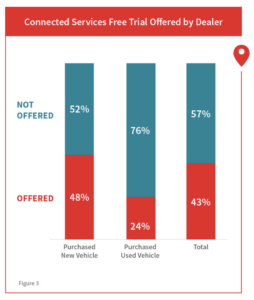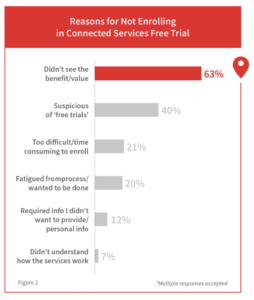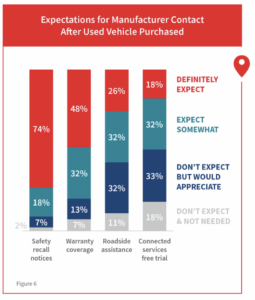
LexisNexis survey shows strong interest in connected services among vehicle buyers
By onAnnouncements | Technology
Nearly 8 in 10 car buyers signed up for a free trial of their vehicle’s connected services when it was offered by a dealer, and nearly half converted to a paid subscription when their free trial ended, according to a LexisNexis Risk Solutions survey published Tuesday.
Yet activation rates are low, because most dealers don’t make buyers aware of the services or offer them an opportunity to enroll, LexisNexis concluded in the survey, “The Driver’s Mindset: Connectivity and Connectedness.”
Sixty-six percent of survey respondents said they were not aware of connected services before buying or leasing their new or used connected car, and 57% said they were not offered a connected services free trial at the dealership.
 Among those not offered a free trial at the dealership, 71% indicated they would have been very or somewhat interested in enrolling if it had been offered.
Among those not offered a free trial at the dealership, 71% indicated they would have been very or somewhat interested in enrolling if it had been offered.
The survey of more than 2,000 U.S. vehicle owners who had bought or leased a new or used car, model year 2017 or newer, was conducted in November 2021. The objective was “to uncover and map potential opportunities to enhance the customer experience throughout the stages of vehicle ownership, so that we can provide insights and support automakers as they continue to develop and execute their connectivity strategies.”
Overall, the study found that U.S. consumers want to hear from OEMs about connected services, as well as safety recalls, warranties, insurance discounts, and other benefits offered through such services.
“Our study shows that automakers are at a confluence. While automakers face increasing competitive pressure to offer the best vehicle ownership experience, and connectivity is mainstream in many aspects of consumers’ lives, there still seems to be lower consumer activation and conversion rates within connectivity programs, despite the benefits,” Dave Nemtuda, head of OEM product, U.S. connected car, LexisNexis Risk Solutions, said in a statement. “The automotive industry can take action on these insights to improve the customer experience, educate consumers on the benefits of connected services and help achieve connectivity-related business objectives.”
 Among those who chose not to sign up for a connected services free trial when offered the chance, data privacy concerns do not appear to have been much of a factor. Just 12% cited “required info I didn’t want to provide/personal info,” while 63% said they didn’t see the value in the services. Also cited were “suspicious of free trials,” 40%; “too difficult/time-consuming to enroll,” 21%; “fatigued from process/wanted to be done,” 20%, and “didn’t understand how the services work,” 7%.
Among those who chose not to sign up for a connected services free trial when offered the chance, data privacy concerns do not appear to have been much of a factor. Just 12% cited “required info I didn’t want to provide/personal info,” while 63% said they didn’t see the value in the services. Also cited were “suspicious of free trials,” 40%; “too difficult/time-consuming to enroll,” 21%; “fatigued from process/wanted to be done,” 20%, and “didn’t understand how the services work,” 7%.
LexisNexis suggested that the opt-out rate could be lowered if dealers were to show buyers how connected services provide features that they value. Among those are the ability for a car to be located, unlocked, or started; roadside assistance; vehicle diagnostics; and eligibility for over-the-air updates (OTA) for a variety of services, including feature upgrades and security patches related to advanced driver assistance systems (ADAS). “[C]onnected cars can detect and transmit diagnostic and operational data from the vehicle systems and request OTA updates, when necessary, which can help reduce the occurrence of catastrophic or safety-related events,” the survey said.
“Consumers are telling us they are open to the engagement that connectivity provides and, in many cases, they expect it,” said Greg Ross, connected car practice lead, for automotive consulting group Motormindz.
 Connected services are even less likely to be activated on a used car. LexisNexis found that 83% of used connected car owners “remain untapped and serve as potential connected services clients…. Moreover, opportunities in the used car parc will continue to grow and eventually will exceed the ones in new cars, since the annual turnover of connected vehicles is much higher than the sales of brand-new connected cars.”
Connected services are even less likely to be activated on a used car. LexisNexis found that 83% of used connected car owners “remain untapped and serve as potential connected services clients…. Moreover, opportunities in the used car parc will continue to grow and eventually will exceed the ones in new cars, since the annual turnover of connected vehicles is much higher than the sales of brand-new connected cars.”
Among used-car buyers, “Nearly everyone (92%), expected to be contacted about safety recall notices, with warranty coverage coming in second, selected by 80% of respondents,” LexisNexis said.
The survey also found that two-thirds of consumers know that their vehicle’s telematics can be used for insurance discounts, but less than a quarter have actually enrolled in such programs. It suggested that enrollments could be increased through greater education.
Among the recommendations of the survey is that dealers protect themselves and their customers from fraud by using identity authentication tools “to check whether the person and the information you are receiving are real. Identity verification and authentication tools let you quickly and safely onboard new customers giving them continual, seamless access to their personalized services. As the value of your services and the number of ways you interact with your customers increase, the risk of fraud increases, too.”
Privacy concerns raised
Even as OEMs are encouraged to enroll their customers in connected services, a consumer group is arguing that government must act to protect drivers’ privacy while in their vehicles.
“Personal car data is the new gold rush of the auto industry. Cars collect more data than our phones. Consumers deserve privacy in their vehicles, and California must lead the way on that issue,” Justin Kloczuko, of the nonprofit Consumer Watchdog, wrote in a July 23 commentary in The Mercury News under the headline, “California must put privacy before automakers’ profits.”
Kloczuko noted media reports that some consumers’ information, such as their vehicle’s location, is being sold to companies that conduct targeted advertising. For instance, “Starbucks tracks your geolocation, so it can know the best time to flash you with a coupon and divert you to the drive-through. This amounts to what is known as ‘behavioral modification.’”
“While location data can be turned off on your cell phone, there’s not yet an opt-out feature for your car,” he said. “One safeguard is ensuring people can protect their privacy and geolocation from intrusive activity.”
Kloczuko encouraged readers to comment on draft regulations written by the California Privacy Protection Agency in response to the passage of Proposition 24, the California Privacy Rights Act. The board convenes for public hearings on Aug. 24 and 25.
Images
Featured image by metamorworks/iStock
